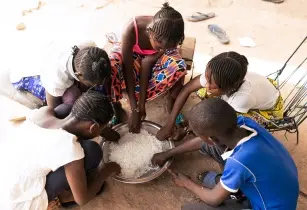The latest Cadre Harmonisé food security analysis shows that more than 35 mn people (including 6.7 mn children) in the region are currently unable to meet their basic food and nutrition needs, which means that a failure to deliver urgent and long-lasting solutions to address food security and hunger will result in the number of hungry people in west and central Africa reaching an all-time high of 48 mn in 2023
The situation is particularly worrying in conflict-affected areas of the Lake Chad Basin and the Liptako-Gourma region (Burkina Faso, Mali and Niger), where 25,500 people will experience catastrophic hunger during the June-August 2023 lean season. This is the period of the year when food stocks from the previous harvest are exhausted, and families struggle to meet their basic food needs until the next harvest.
In a joint statement at the annual meeting of the Network for the Prevention of Food Crisis in West Africa (RPCA) in Lomé (Togo), the Food and Agriculture Organisation of the United Nations (FAO), the United Nations Children’s Fund (UNICEF) and the United Nations World Food Programme (WFP) urged governments across the region to increase support and investments in food security and nutrition programmes that reinforce the resilience of communities, and protect their livelihoods while reducing the risk of people falling into catastrophic food insecurity.
“The food and nutrition security outlook for 2023 is extremely worrying and this should be the last wake-up call for governments of the region and their partners,” said Chris Nikoi, WFP’s regional director for the western Africa region. “Strengthening the resilience of communities has to become a singular and collective focus for us all if we are to pull this situation back from the precipice before it is too late.”
Despite the good harvest prospects, improved market situation, and increased cereal production estimates across the region, food insecurity and malnutrition persist and are spreading from the Sahel towards coastal countries due to persistent insecurity, climate shocks, high food prices, the economic fallout from COVID-19, and the impact of the conflict in Ukraine.
“The Sahel is teetering on the brink of full-blown catastrophe; we are seeing food availability decline in most countries, and fertiliser prices are on the rise,” said Robert Guei, FAO’s sub-regional Coordinator for West Africa. “This could have a negative impact on harvests next year and worsen an already-grave situation for many rural communities. We must act now to shore-up rural livelihoods before it is too late.”
“We need to scale up treatment and put much more attention on preventing child malnutrition through a multi-sectoral approach to reach every child,” said Marie-Pierre Poirier, UNICEF regional director for West and Central Africa.
The three UN agencies and their partners commit to addressing this unprecedented food and nutrition crisis through a robust food systems approach involving multiple and integrated programmes that provide food, nutrition, health, water, hygiene, and sanitation response targeting children, women and other vulnerable groups.
FAO, UNICEF and WFP will reinforce and expand their ongoing support to national social protection systems that are responsive to shocks and sensitive to nutrition for pregnant women, nursing mothers, young children and adolescents. Building on existing systems at local, national and regional levels - and with the full participation of local communities - the three UN agencies will also scale up their medium to longer term solutions aiming to reinforce resilience of crisis-affected communities, while supporting peace building and peaceful coexistence.





